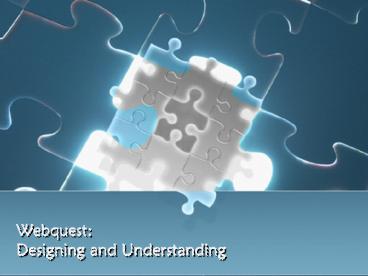Webquest: Designing and Understanding - PowerPoint PPT Presentation
1 / 29
Title:
Webquest: Designing and Understanding
Description:
'inquiry-oriented activities in which some or all of the information that ... http://www.pekin.net/pekin108/wash/webquest/ Journalistic Tasks ... – PowerPoint PPT presentation
Number of Views:62
Avg rating:3.0/5.0
Title: Webquest: Designing and Understanding
1
WebquestDesigning and Understanding
2
What is a Webquest?
Webquests are "inquiry-oriented activities in
which some or all of the information that
learners interact with comes from resources on
the Internet."
3
The Webquest Design Process
4
Webquest Taskonomy A Taxonomy of Task
The task is the single most important part of a
webquest. It provides a goal and focus for
student energies and makes concrete the
curricular intentions of the designer.
5
Retelling Tasks
- A modest WebQuest could be based on retelling if
- the format and wording of their report is
significantly different than what they read
(i.e., the report wasn't produced by cutting and
pasting) - students are given latitude about what to report
and how to organize their findings - skills of summarizing, distilling, and
elaborating are required and supported.
6
Retelling Task Example
Kia Ora and Kisses From New Zealand http//asterix
.ednet.lsu.edu/edtech/webquest/maori.html
7
Compilation Tasks
To make a compilation task qualify as a true
WebQuest, there needs to be some transformation
of the information compiled. Simply putting a
hotlist of web sites or a collection of web
images together arbitrarily isn't enough.
8
Compilation Task Example
WebQuest The 1960's Museum http//school.discov
ery.com/schrockguide/museum/webquest.html
9
Mystery Tasks
- A well designed mystery task requires synthesis
of information from a variety of sources. Create
a puzzle that cannot be solved simply by finding
the answer on a particular page. Instead, design
a mystery that requires one to - absorb information from multiple sources
- put information together by making inferences or
generalizations across several information
sources - eliminate false trails that might seem to be
likely answers at first but which fall apart
under closer examination.
10
Mystery Task Example
http//www.pekin.net/pekin108/wash/webquest/
11
Journalistic Tasks
- A well designed journalistic task will require
your students to - maximize accuracy by using multiple accounts of
an event - broaden their understanding by incorporating
divergent opinions into their account - deepen their understanding by using background
information sources - examine their own biases and minimize their
impact on their writing.
12
Journalistic Task Example
The Guilded Age Webquest http//oswego.org/staff/t
caswell/wq/gildedage/student.htm
13
Design Tasks
The key element in a design task is to build in
authentic constraints. Asking students to design
an ideal X without also requiring them to work
within a budget and within a body of legal and
other restrictions doesn't really teach much.
14
Design Task Example
Canada A Family Vacation http//www.cesa8.k12.wi.
us/teares/it/webquests/canada/index.html
15
Creative Tasks
Creative WebQuest tasks lead to the production of
something within a given format (e.g. painting,
play, skit, poster, game, simulated diary or
song) but they are much more open-ended and
unpredictable than design tasks.
16
Creative Task Example
Radio Days A Webquest http//www.thematzats.com/r
adio/index.html
17
Consensus Building Tasks
The essence of a consensus building task is the
requirement that differing viewpoints be
articulated, considered, and accommodated where
possible.
18
Consensus Building Task Example
http//www.kn.pacbell.com/wired/China/ChinaQuest.h
tml
19
Persuasion Tasks
Persuasion tasks might include presenting at a
mock city council hearing or a trial, writing a
letter, editorial or press release, or producing
a poster or videotaped ad designed to sway
opinions.
20
Persuasion Task Example
The Amistad Case A Mock Trial http//projects.edt
ech.sandi.net/hoover/amistad/
21
Self-Knowledge Tasks
- A well crafted self-knowledge task will compel
the learner to answer questions about themselves
that have no short answers. Such tasks could be
developed around - long term goals
- ethical and moral issues
- self-improvement
- art appreciation
- personal responses to literature.
22
Self-Knowlege Task Example
What Will I Be When I Get Big http//www.slc.k12.u
t.us/webweavers/johnc/my_life.html
23
Analytical Tasks
In analytical tasks, learners are asked to look
closely at one or more things and to find
similarities and differences, to figure out the
implications for those similarities and
differences.
24
Analytical Task Example
Meet the Immigrants http//www.lubbockisd.org/webq
uests/MeetImmigrants/index.htm
25
Judgment Tasks
Judgment tasks present a number of items to the
learner and ask them to rank or rate them, or to
make an informed decision among a limited number
of choices.
26
Judgment Task Example
The Rain Forest Project http//projects.edtech.san
di.net/ofarrell/rainforest/
27
Scientific Tasks
- What does a scientific task look like? It would
include - making hypotheses based on an understanding of
background information provided by on- or
off-line sources - testing the hypotheses by gathering data from
pre-selected sources - determining whether the hypotheses were supported
and describing the results and their implications
in the standard form of a scientific report.
28
Scientific Task Example
Finding the Lighthouse Diamond Thief by Using
theScientific Method http//projects.edtech.sand
i.net/kroc/scimethod/
29
(No Transcript)

